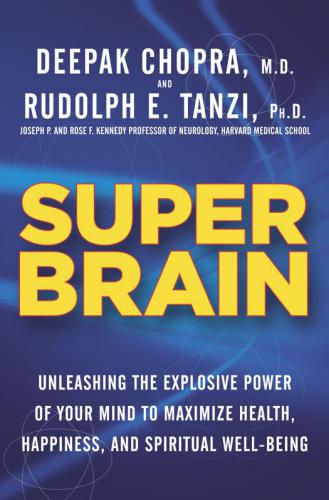
Super Brain
Unleashing the Explosive Power of Your Mind to Maximize Health, Happiness, and Spiritual Well-Being
فرمت کتاب
ebook
تاریخ انتشار
2012
نویسنده
Deepak Chopra, M.D.ناشر
Harmony/Rodaleشابک
9780307956842
کتاب های مرتبط
- اطلاعات
- نقد و بررسی
- دیدگاه کاربران
نقد و بررسی

September 10, 2012
In their thought-provoking new work, medical/spiritual guru Chopra (The Ultimate Happiness Prescription) and Tanzi, a Harvard neurologist researching Alzheimer’s and genetics, examine the link between up-to-the-minute brain research and time-tested spiritual wisdom. “Super brain stands for a fully aware creator using the brain to maximum advantage. Your brain is endlessly adaptable”—and this adaptability, the authors say, is the solution to problems ranging from anxiety and depression to memory loss; you can use your brain to reduce the common hazards of aging and aid in self-healing. The key is making the best use of your brain’s flexibility. “Habits are mental grooves” that rely on well-established neural networks in your brain, and the authors explain how the brain’s ability to create new neural networks allow you to change how you perceive yourself and the world. The authors view depression, for instance, as a mental, or brain, habit (“It’s all my fault”) and you can retrain your brain to find new perspectives (“It was unpredictable”). The final chapters focus on achieving longevity, spiritual balance, and well-being. A fascinating treatise on the power of the brain to aid you in improving yourself and your life.

October 1, 2012
A mixture of recent research in the neurosciences and spiritual wisdom passed down through generations. With his dozens of best-selling books, Chopra (co-author: War of the Worldviews: Science vs. Spirituality, 2011, etc.) has arguably done more than anyone to bring Eastern spirituality and healing practices to the West. His oeuvre brings to mind an inebriated dart player in a tavern--many attempts go wild, but when he connects, you're convinced he's a natural. This book, co-authored with Alzheimer's Genome Project head Tanzi (Neurology/Harvard Medical School; co-author: Decoding Darkness: The Search for the Genetic Causes of Alzheimer's Disease, 2001, etc.), continues the trend of laying Eastern thought over Western science. This "tag team" author approach lends credibility to the less scientifically rigorous ideas Chopra has to offer, but with varying degrees of success. The plasticity of the young brain and the rate at which new synapse connections are made in children; the importance of regular physical activity and exercise; the idea that instincts and emotions are integral and necessary to social relations--these scientific propositions, as they're laid out, won't strike readers as either controversial or revolutionary. The authors theorize about connections between neuroscience and long-held beliefs about the mind, and many of these connections don't require a leap of faith to accept as valid hypotheses. The lion's share of the text, however, consists of platitudes and value judgments about happiness and success that can't really be held forth as a prescription for the "next leap in the human brain's evolution." Examples include such statements as, "Mind, not the brain, is the origin of consciousness," and the suggestions that an abused wife should "stop exposing herself to stresses that occur over and over." For Chopra fans only--as such, likely to become a best-seller.
COPYRIGHT(2012) Kirkus Reviews, ALL RIGHTS RESERVED.

























دیدگاه کاربران